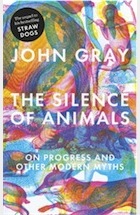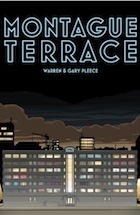The Silence of Animals - Montague Terrace
 The Silence of Animals - John Gray
The Silence of Animals - John Gray
It was over a decade ago that I read John Gray's provocative book Straw Dogs: Thoughts on Humans and Other Animals. It really was like a shock to the brain filled with incendiary thoughts that infused and infuriated me in equal measure. Its hard after the intervening years to remember much of the detail of the book (it's hard after those years and the arrival of two children to remember much at all) but one thing remained very clear in my mind and that was Gray's huge mistrust in the Enlightenment idea of progress. This he felt was the biggest lie that we humans tell ourselves; not only that we are by nature different from the other animals on the planet but that our achievements in science and technology are making our lives anything more than superficially better. As he expresses in this new book - 'Lacking a self-image of the sort humans cherish, other animals are content to be what they are. For human beings the struggle for survival is a struggle against themselves'. The Silence of Animals is billed very much as a sequel to that book, developing on those same themes to further illustrate how we delude ourselves with notions of progress and content ourselves with fantasy and myth in order to support those thoughts.
Whereas Straw Dogs read like the thoughts of the author, backed up by occasional literary sources, this follow up is far more like a companion piece with much deeper references from other works of literature. Borges, Orwell, Ballard and Conrad are all cited and having read some of the writers he quotes in the intervening years I was able to confront the thoughts head on and find them stimulating in a different way to those I had had to take for granted when reading the first book. But my overall impression on finishing the book was that this was less a development of his ideas than a reinforcement of them. It was as though Gray had spent the last decade finding support for his personal philosophy in the literature he read and now wanted to share it as if to say, 'See, I'm not the only one.' This is fine, naturally, and there are lots of interesting thoughts along the way, particularly when examining our propensity to fiction and how it shapes our lives and Gray's thoughts on how the whole concept of talents might be a terrible straitjacket on our personal potential rather than the best way to realise it. It just means that this volume lacks some of the fire of its predecessor and will probably further annoy anyone who took exception to his thoughts from then too.
There is an interesting battle as well with biblical references and images. Gray frequently aims to show that there is very little difference between the comforts of organised religion and religious faith alongside the faith that accompanies the Enlightenment ideal of progress. If religion is the opiate of the people then 'like cheap music, the myth of progress lifts the spirits as it numbs the brain'. We must all have at least occasionally wondered about the very meaning of life, the reason for us being here, and Gray is determined that we should let that thought go
Why do humans need a reason to live? Is it because they could not endure life if they did not believe it contained hidden meaning? Or does the demand for meaning come from attaching too much sense to language - from thinking that our lives are books we have not yet learnt to read?
We fictionalise our own lives and if we could only accept that, Gray asserts, and also that our world is without meaning we might discover not a loss of value but that 'this nothingness may be our most precious possession, since it opens to us the world that exists beyond.' How you may react to that and other thoughts will be entirely personal of course. Gray I'm sure will content himself that T.S Eliot said it best in Burnt Norton - human kind cannot bear much reality.
Published now by Allen Lane
 Monatague Terrace by Warren and Gary Pleece
Monatague Terrace by Warren and Gary PleeceAnimals also feature in this graphic novel from the Pleece brothers in the form of an unforgettable rabbit, Marvo the magic bunny, companion and co star to a rather shambolic magician called Marty. They are just two inhabitants of the fading Art deco housing block that gives the novel its name and which contains more nuttiness than a Reece's peanut butter cup.
 The book is made up of 12 main stories and a few interludes and through them we meet the varied inhabitants of this bonkers building. Each of the stories is as tenuously linked as we all might be to the comings and goings of those around us but also by something slightly deeper relating to the building itself. There is a faded singer who sits around listening to his biggest hit, a bright young thing novelist with writer's block, a genius scientist with a price on his head, someone calling himself The Puppeteer, and an old special forces operative who may look like a granny but who hasn't quite given up the fight yet.
The book is made up of 12 main stories and a few interludes and through them we meet the varied inhabitants of this bonkers building. Each of the stories is as tenuously linked as we all might be to the comings and goings of those around us but also by something slightly deeper relating to the building itself. There is a faded singer who sits around listening to his biggest hit, a bright young thing novelist with writer's block, a genius scientist with a price on his head, someone calling himself The Puppeteer, and an old special forces operative who may look like a granny but who hasn't quite given up the fight yet.Given all the craziness this is a pretty disparate novel and how well it all holds together will depend on how many of the stories you really connect with. The device that holds them all together might come across as a bit silly and even nostalgic, and that's the prevailing feeling I was left with; something like the curious quality that comes with watching Tales of the Unexpected. This book is easy to read and to enjoy but there's not enough beneath that Art deco facade to send me back in again.
Published now by Jonathan Cape






0 comments:
Post a Comment